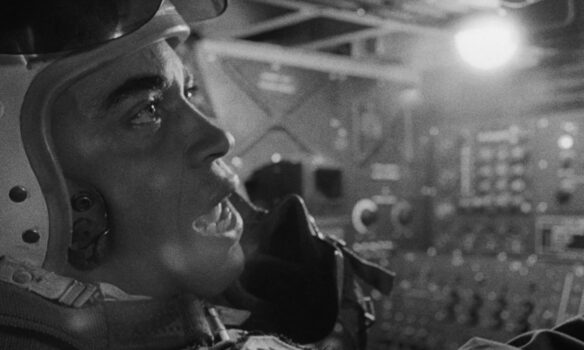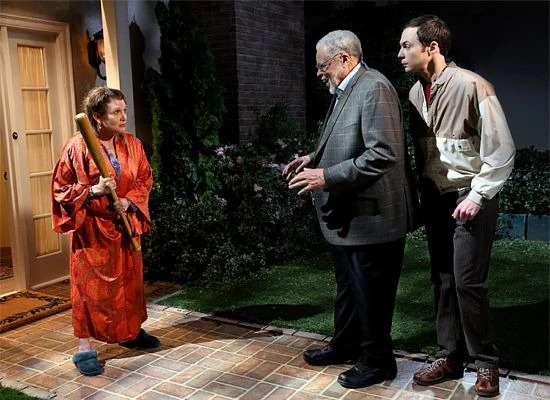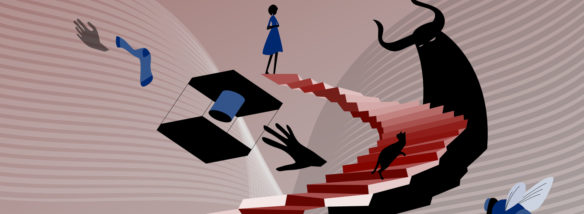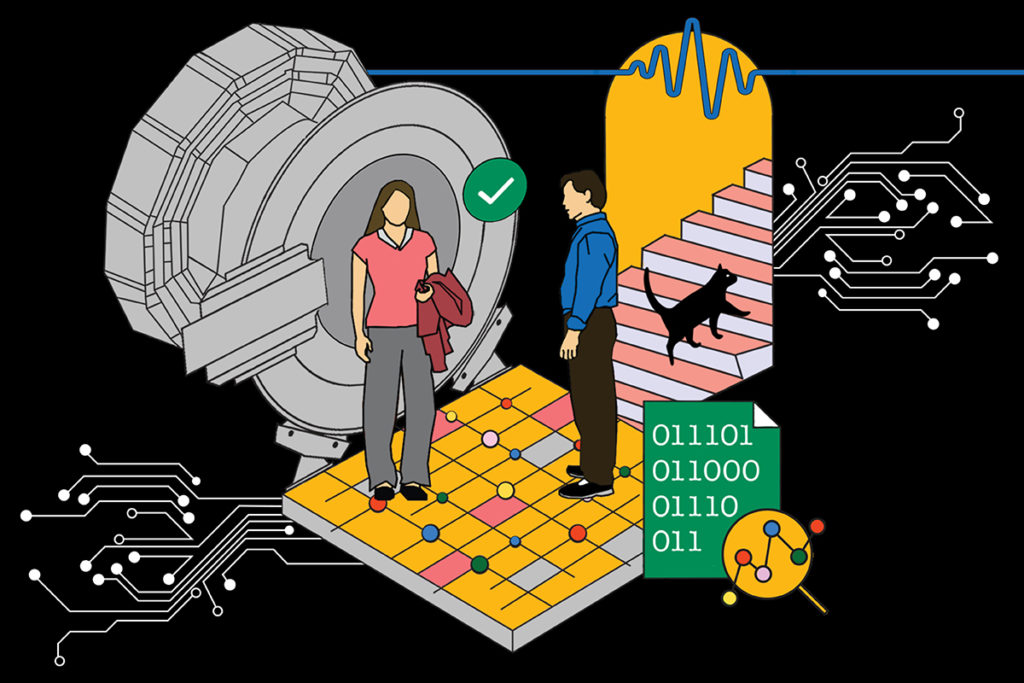(1) PROBABLY SOMETHING. I would use Patrick Morris Miller’s entire verse as the title if it wouldn’t break Jetpack. Here are the lyrics he posted in comments.
Something quite fannish,
Something quite slannish,
Something for everyone,
A pixel scroll tonight!from A Funny Thing Happened on the Way to the Consuite
(2) TAFF NEWS. Taffluorescence 4, downloadable from the link, has the latest on the Trans-Atlantic Fan Fund: (1) a two-vote correction to the TAFF results reported a couple weeks ago, (2) winner Sarah Gulde’s basic itinterary, and (3) financial information.
(3) QUANTUM SHORTS WINNERS. The winners of the Quantum Shorts flash fiction contest have been announced. The stories can be read at the links.
First Prize
- “A World in Threads” by Acadia Reynolds
Runner-Up
- “The Observer” by Dan Goodman
People’s Choice Prize
- “Root Consciousness” by Tony Tsoi
The two stories were selected for the competition’s top honors by Quantum Shorts judges Chad Orzel, George Musser, Ingrid Jendrzejewski, José Ignacio Latorre, Ken Liu, Leonardo Benini and Tania De Rozario from a shortlist of ten quantum-inspired stories. The winner receives $1500, and the runner-up gets $1000.
The People’s Choice Prize was chosen by a public poll on the shortlist, and includes $500.
In addition to the shortlist award, certificate and digital subscription to Scientific American that is awarded to all the finalists, the three winners will receive cash awards and an engraved trophy.
(4) FOR XUYA COMPLETISTS. “The Universe of Xuya by Aliette de Bodard” at Laura’s Library.
…The Universe of Xuya by Aliette de Bodard is one of the Best Series finalists for the 2024 Hugo Awards. As this point, there are two novels and 33 pieces of short fiction (4 novellas, 13 novelettes, and 16 short stories). Since the main connection between them is the setting, they can pretty much be read independently and in any order. Take a look at the author’s webpage about the series for suggestions on where to start and background information….
(5) WRITER BEWARE. Jeanne Veillette Bowerman explains “How a Book Really Becomes a Movie” in a guest post at Writer Beware. Here the introduction.
… The filmmaking industry baffles many—even those working in it. The reality is, there is no single way to get a film made. There are quite literally as many ways to break in as there are writers who’ve successfully done so, making scams harder to identify.
Sadly, when someone proactively reaches out to you, you have to assume it’s fake until you can prove otherwise. With scams abounding, the burden of proof has shifted. Due diligence has never been more important.
- You do NOT need a screenplay to sell your book-to-film rights.
- You do NOT need a sizzle reel or “cinematic trailer”.
- You do NOT need storyboards.
- You do NOT need mood boards.
- You should NOT have to pay any upfront fees.
- You should NOT be required to buy anything.
Let’s go through the traditional paths first, then I’ll share an unusual story to demonstrate how varied this process can be….
(6) IF YOU LIKE SCIENCE IN YOUR SF. AND ROMANCE. [Item by Ersatz Culture.] The Bookseller had an article about an upcoming romance novel that has a plot element that might be relevant to File 770: “Rights – Corvus snaps up Rose McGee’s STEM rom-com Talk Data to Me”.
Corvus has snapped up Rose McGee’s “delightful” STEM rom-com, Talk Data to Me…
“Physicists Dr Erin Monaghan and Dr Ethan Meyer are bitter rivals,” the synopsis says. “They are each at the forefront of their opposing fields and competing for everything: grant money, lab time, government backing. But fate has lined up a meet-cute on the pages of sci-fi magazine Galactica. Erin’s short story and Ethan’s illustrations are paired for publication, and when they meet online as their alter egos ‘Aaron Forster’ and ‘Bannister’, sparks fly.”
(7) HOMEMADE WHO. “Watch: The Doctor Who movie being filmed in Cardiff” at Nation Cymru.
A Doctor Who fan feature film described as a ‘passionate tribute to the classic ’70s and ’80s series’ is being filmed in Cardiff using local amateur actors and crew.
The movie titled ‘Dr Who meets The Scorpion’ is to be released as a non-profit film on YouTube purely for the pleasure of the fans to watch.
As of last month – 45 minutes of the 70 minute feature film is already in the can.
Now the makers of the movie have launched a crowdfunding campaign to raise the funds needed to complete filming…. [Dr Who meets the Scorpion at Greenlit]
…Are there any copyright implications in making something like this and how would you circumnavigate them?
There are literally hundreds of Dr Who fan films out there on Youtube. As well as Star Trek, Star Wars, James Bonds fan films. As long as you don’t try to make money out of something like Doctor Who that belongs to the BBC there has never been a problem. If you put it out on Youtube for free purely for the enjoyment of the fans then I don’t think the BBC is concerned. I’m not trying to compete with the BBC series and wouldn’t want to. How could we on our tiny budget? We’re trying to give a flavour of the 70s/80s series with a bit of the Peter Cushing Dalek movies thrown in as well. It’s my homage to the days of the classic series where the ingenuity of the designers faced with a tight budget produced some iconic sets and monsters out of nothing. Just like I’m having to do! That’s always been the charm of the classic series for me.
What is the plotline of Dr Who meets The Scorpion without giving away spoilers obviously?
The Doctor bumps into Jennie in a deserted warehouse at night, both there to find out more about the mysterious Scorpion company. They start to unravel a fiendish plot by the arch villain Scorpion and his right hand man Taylor which takes them from Earth to a planet far, far away! Thrills, spills, monsters, peril and adventure await them…and we couldn’t resist including the iconic Daleks as well!…
(8) TODAY’S BIRTHDAY.
[Written by Cat Eldridge.]
Born April 14, 1925 — Rod Steiger. (Died 2002.) Let’s start with Rod Steiger’s best-known genre role as Carl in The Illustrated Man. The film is based off of three short stories from Bradbury’s The Illustrated Man released first seventy-three years ago, “The Veldt”, “The Long Rain” and “The Last Night of the World” with all three having been published elsewhere previously.
Need I say that I madly, deeply love this collection? I have it as an audiobook from Audible with the narrator being Scott Brick who does the Philip Marlowe series.
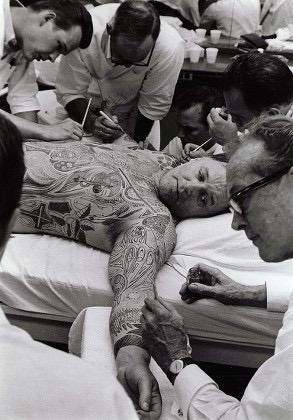
Steiger gives his usual commanding performance though I do think he was a bit much at times. Hostile and violent, it’s hard to feel any sympathy for him. That of course is the role. And setting aside the role, there’s that illustrated body. I wasn’t sure if it was his body that got illustrated or not until I actually found the image below which indicates that indeed he got inked before every filming session. Cool.
Let’s not forget the other two principal actors, Claire Bloom and Robert Drives, who put on magnificent performances as well. It was nominated for a Hugo at Heicon ’70.
He had several genre roles after that, all interesting.
A decade after this film, he’s in The Amityville Horror as Father Francis ‘Frank’ Delaney, a rather great role.
He’s Dr. Phillip Lloyd in The Kindred. Hey, it has a tentacled baby in it. Need I say more?
In Tim Burton’s Mars Attacks! he is a United States Army General who did not trust the Martians, and advised nuclear warfare against them, an action which that is not allowed by President Dale.
He sank his teeth, no I couldn’t resist into his next role as Dr. Van Helsing, leader of Van Helsing’s Institute of Vienna in Modern Vampires (also known as Revenant).
Finally he’s in an Arnold Schwarzenegger film, End of Days, a horror film about a young woman who is chosen to bear the Antichrist. He’s Father Kovac here.
(9) COMICS SECTION.
- Arlo and Janis on understanding the universe.
(10) ALSO KNOWN AS. Rich Horton has put together a “Pseudonyms Quiz” for readers of Strange at Ecbatan.
…Most of these questions are about writers, but there are some from the film world, one singer, and one more politically-oriented individual. I’ll have answers in a couple of days. If you wish, leave your guess in the comments….
I got 11 out of 16, greatly aided by the hints that Horton sprinkled along the way. Not bad, but I expect to hear from Filers who have run the table.
(11) ADD ONE TO THE BUCKET LIST. “Deadpool & Wolverine Getting ‘Intentionally Crude’ Popcorn Bucket Kevin Feige Reveals” – story at Comicbook.com.
…While the folks behind the Dune: Part Two bucket (probably) didn’t intend for people to view it in a lewd way, Marvel Studios has decided to take the idea and run with it for Deadpool & Wolverine. Kevin Feige took the stage at CinemaCon today during Disney’s presentation and revealed the movie will have an intentionally risqué popcorn bucket.
“Deadpool & Wolverine is getting a popcorn bucket which will be intentionally crude and lewd. #CinemaCon,” ComicBook.com‘s Brandon Davis shared on Twitter while attending the presentation…
(12) GRADE INFLATION. [Item by Mike Kennedy.] This Variety article about movies presented at industry-insider CinemaCon is packed with information on upcoming releases. But it’s hard to take their overall conclusions too seriously since none of the companies’ slates received a grade below a B-. “CinemaCon Winners and Losers: ‘Gladiator 2,’ ‘Wicked,’ ‘Deadpool 3’”.
Hollywood decamped for Las Vegas this week for CinemaCon, looking to reassure movie theater owners and executives that they had what it takes to keep audiences flocking to cinemas through 2024 and beyond. And despite odes to the magic of the big screen experience, there was a whiff of desperation in the artificially-oxygenated, cigarette-perfumed air of Caesars Palace, where the annual exhibition trade show takes place.
That’s because the box office hasn’t recaptured its pre-pandemic stride — studios estimate that roughly 15% to 20% of frequent moviegoers have yet to resume their old entertainment habits now that COVID has dissipated. Plus, the labor strikes that consumed the media industry for much of the previous year as actors and writers hit the picket lines resulted in production delays that left theaters with fewer movies to hawk on their marquees….
….After four days filled with hours-long pitches to tease blockbuster hopefuls and big gambles, Variety has assessed the studio presentations that may have missed the mark or could just salvage the struggling box office….
(13) STIFFED AGAIN. In Morecambe & Wise’s 1980 Christmas Special, Peter Cushing makes another attempt to get the money he’s owed for appearing in the M&W show in the early 70’s
(14) VIDEO OF THE DAY. Jim Benson’s TV Time Machine investigates “What Happened to the Rod Serling’s Night Gallery Paintings?”
What happened to the Night Gallery paintings? Night Gallery co-author Jim Benson reveals the strange and sometimes sad fate of these classic, and valuable, TV artifacts. The fate of the Night Gallery paintings has always been shrouded in mystery–until now!
[Thanks to Cat Eldridge, SF Concatenation’s Jonathan Cowie, Steven French, Ersatz Culture, Kathy Sullivan, Mike Kennedy, Andrew Porter, John King Tarpinian, and Chris Barkley for some of these stories. Title credit belongs to File 770 contributing editor of the day Patrick Morris Miller.]


